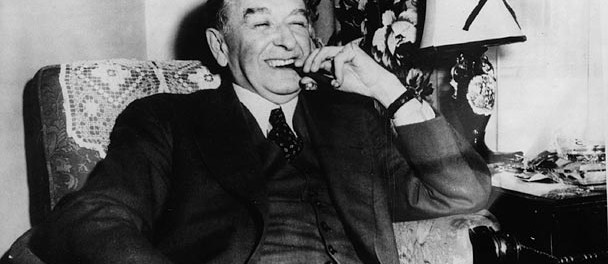1949: Asbestos in the Air & Other Quebec Curios
Part of "Shadows and Revolution", 1900-1960
Well into his third term as Premier, Maurice Duplessis‘ campaign to electrify the countryside was going well, while his operation that imprisoned hundreds of thousands of children by declaring them mentally unstable was being kept well out of reach of the public. However, there was one thing that marked a bump in his premiership: a little city called Asbestos, situated near the Nicolet River.
The city of Asbestos, as the name suggests, thrived on its mining of asbestos. Though it is now known as a carcinogenic fibre that is a major factor in causing certain forms of cancer, in Duplessis’ day, it was a common ingredient in items from pipes to insulation for housing. Trade unions usually were deferent to Duplessis, opting for quiet rather than suffering Duplessis’ hounding, however, in February 1949, workers started to rally against their American patrons in order to reclaim a better pay and better working conditions.
Duplessis was a supporter of big American companies coming to Québec to do business. Indeed, one of his measures to try and kick start Québec jobs was to invite these companies in during the Great Depression, a measure that had questionable results. The American companies would, in turn, hire French-Canadian workers, such as those in Asbestos, but conditions were often minimal at best. For a mining city such as Asbestos, where health issues were a concern due to the fibrous consistency of asbestos and its risk of inhalation, workers reclaiming regular testing was a big step forward for their rights.
The Asbestos strike did not materialise overnight. It was the culmination of discussions that had started to break down in December of 1948. The workers had refused arbitration because their patrons would have inevitably chosen arbitrators that would rule in their favour. The workers decided to take a chance to strike. Duplessis heard about the strike, and since the mines in the immediate vicinity of Asbestos provided about 90% of the Québec supply of asbestos, the strike risked to snowball. About two weeks after the workers started to strike, Duplessis declared the strike illegal. And yet the strike continued. The press started coming in from all around the world. Police would often close in on the town and arrest and beat protestors, actions which only, naturally, garnered sympathy for the workers.
Reactions to the Asbestos strike were varied and whether it was a good or a bad thing largely depended on the ideology the speaker or writer subscribed to. For militant French-Canadians, it was a wake-up call and a people’s movement against the Anglophone élite. A certain Pierre Elliott Trudeau, a young socialist news reporter, described it as the proletariat awakening to realise they were being oppressed by institutions that held a dominant class in place. Gérard Pelletier, a reporter for Le Devoir, met up with his old friend, Jean Marchand, a unionist whose electrifying presence provided much of the energy in the early days of the strike. Finally, Duplessis, an ardent anti-Communist and anti-socialist, described the strike as being a “challenge” and an attempt to “break the State’s authority”. Certain members of the Catholic Church were supporters of the strike, citing the fact that they were the keepers of the working class and must take a stand against those who sought to destroy their demographic. Their position infuriated Duplessis, who often worked hand-in-hand with the Church and relied on them to keep his party line in the minds of the people, to the point where he would banish the Archbishop of Montréal, a vocal supporter of the workers, from Québec. In the end, it was the main Archbishop of Québec who would broker the peace between the Asbestos strikers and their patrons.
The Asbestos strike helped launch the careers of three young men who would be the new faces of Québec federalism for the next generation of politicians. Jean Marchand, Gérard Pelletier, and Pierre Elliott Trudeau would enter federal politics for the 1965 federal election, recruited by Lester B. Pearson as Liberal candidates in Québec.






